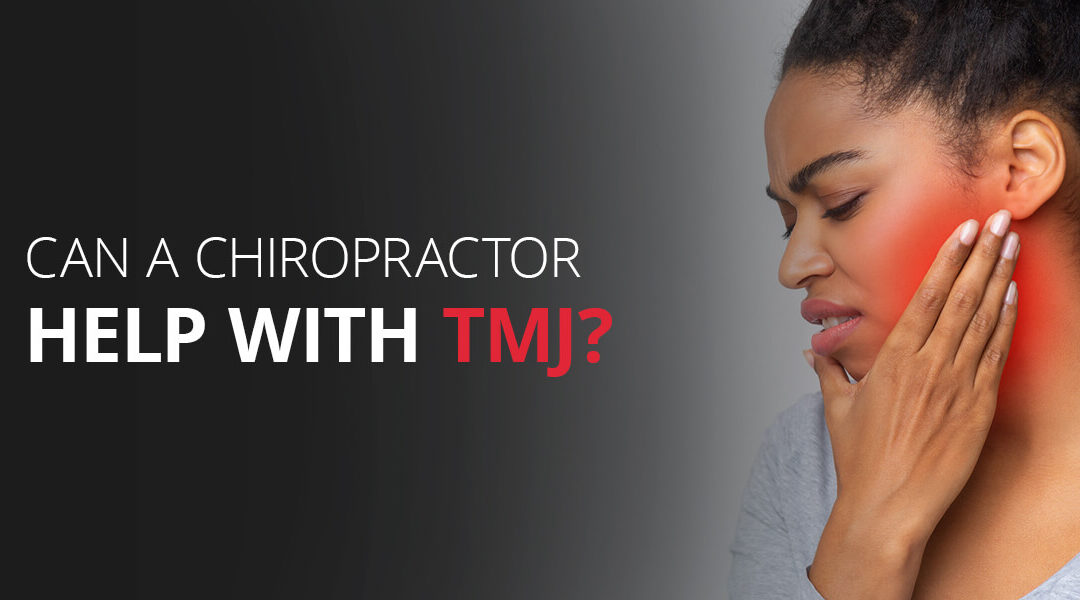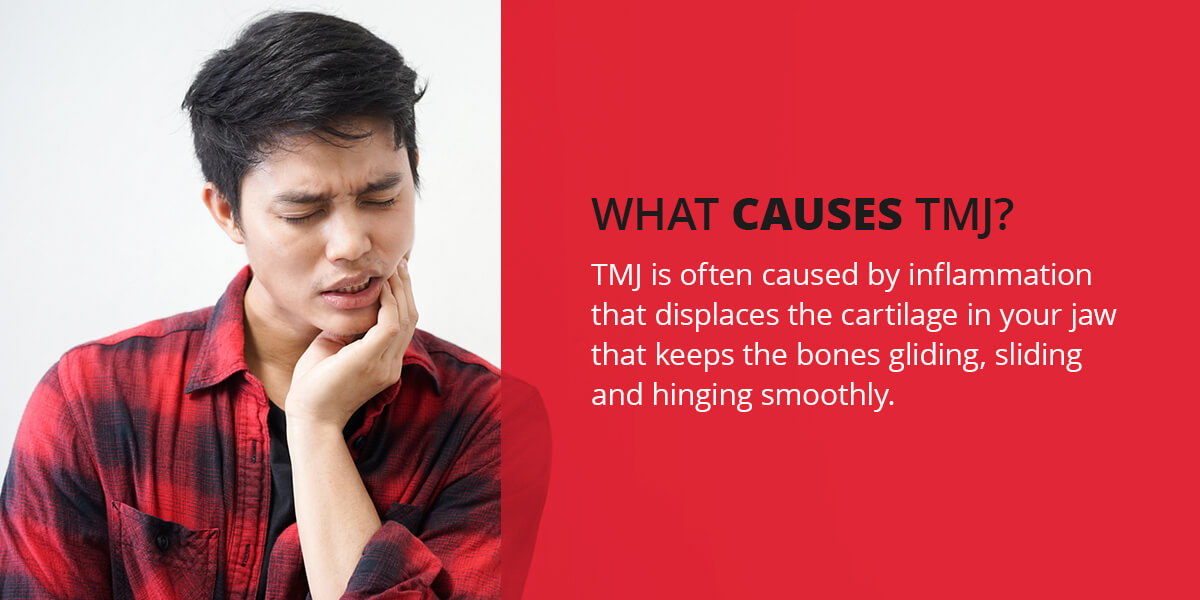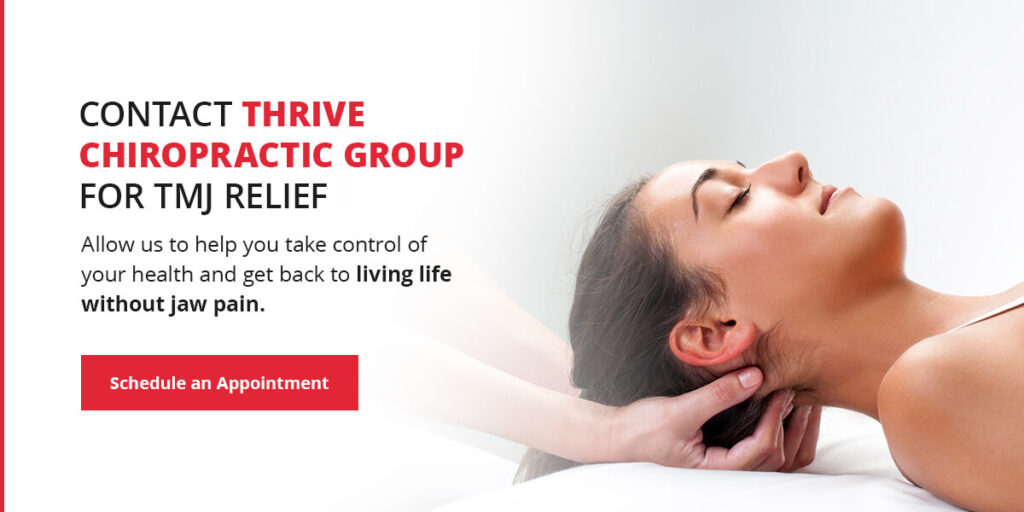Debilitating, painful or annoying jaw pain could be caused by a temporomandibular joint (TMJ) disorder. These disorders can create pain and tenderness in the joints in your jaw, causing discomfort and disrupting your life. While TMJ disorders impact approximately 10 million Americans, it can often feel isolating to be suffering from TMJ-induced pain and discomfort.
The good news is that there are options available to provide relief. Chiropractors offer adjustments for TMJ to help reduce pain and relieve discomfort. Chiropractic TMJ adjustments along with at-home work to the area’s soft tissue can provide both instant and long-term relief for TMJ pain.
What Is TMJ?
The temporomandibular joint connects your lower jaw, or mandible, to the skull’s temporal bones. This joint opens and closes your mouth at a hinge. The joint hinges open, and with the help of your facial muscles, it provides adequate function to your jaw. It also moves in a sliding motion, allowing you to move your jaw side-to-side and forward-to-backward. It facilitates your jaw’s range of motion, enabling you to bite, talk, chew, yawn and sing.
TMJ is a more common term for temporomandibular disorder (TMD) that describes the conditions affecting the temporomandibular joints. Both acute and chronic inflammation can result from TMJ disorders, causing pain and tenderness to the TM joint and surrounding muscle and nerves. This inflammation can make it difficult to eat and talk.
TMJ Symptoms
TMJ disorders can present in many ways. Some of the most common symptoms include jaw pain and soreness, pain in the jaw when biting or chewing, jaw stiffness and popping or clicking noises when opening your mouth. Not all TMJ symptoms are as obvious. Other symptoms include:
- Ear pain
- Tinnitus, or ringing in the ears
- Tooth sensitivity not caused by other dental conditions
- Headaches and dizziness
- Pain in the neck
People suffering from any of these symptoms should reach out to a chiropractor to see if TMJ may be the cause.
What Causes TMJ?
TMJ is often caused by inflammation that displaces the cartilage in your jaw that keeps the bones gliding, sliding and hinging smoothly. When this cartilage is displaced, you may experience TMJ pain. These muscles may become inflamed from trauma or injury to the jaw area, such as your neck, shoulder or facial muscles. Other common causes include:
- Teeth grinding
- Arthritis in the jaw
- Teeth clenching
- Disorders that cause the discs in the jaw to deteriorate or move
Chiropractic Treatment for TMJ
Chiropractors make adjustments to the TM joint to alleviate pain and relax the muscles in the area. This treatment can provide immediate and ongoing relief for TMJ-associated symptoms. When going to the chiropractor for TMJ pain, you may receive a combination of soft tissue work and jaw adjustments.
Soft Tissue Therapy for TMJ
Soft tissue therapy for TMJ disorders focuses on three key muscles around your jaw. Chiropractic therapy in conjunction with at-home soft tissue therapy on the masseter, temporalis and pterygoid muscles can provide relief for TMJ disorder symptoms.
Chiropractic and At-Home Soft Tissue Therapy on the Masseter Muscle
The masseter muscle is a thick and deep muscle in your upper jaw that plays a vital role in chewing. If you clench your jaw, you can feel the muscles moving on the sides of your lower jaw. These are your masseter muscles.
Chiropractic and at-home therapy for masseter muscles involves you or your jaw realignment chiropractor placing two fingers flat against your jaw. With light pressure on the muscles, open and close your mouth. Repeat this three times on multiple areas of the masseter muscle, in repetitions of three. Integrate this into your daily routine three times per day to achieve the best results.
Chiropractic and At-Home Soft Tissue Therapy on the Temporalis Muscle
The temporalis muscle is clam-shaped and also runs alongside your jaw, but extends up toward your temples as well. It is much thinner than the masseter but covers more area along your head. It is responsible for most chewing functions. The same exercises for the masseter muscle can be used for the temporalis — to account for the broader range of the muscle, use four fingers instead.
Apply pressure to different areas of your face, encompassing your jaw up to your temples, and open and close your mouth three times. Because the temporalis muscle is much thinner than the masseter, remember to apply softer pressure. The best practice for this exercise is to do three sets of three repetitions of opening and closing your mouth. Repeat these three sets three times per day.
Chiropractic Therapy on the Pterygoid Muscle
The pterygoid muscle therapy is much more complex and generally requires a person to perform the soft tissue work on you, instead of you performing it on yourself. Because of the technique needed, the complexity of the treatment and the discomfort that is possible with this treatment, it is best to see a licensed chiropractor. The pterygoid muscle is often weaker than the masseter and temporalis muscles so it may be uncomfortable to work on this tissue.
Chiropractic Jaw Adjustments for TMJ
After soft tissue work, your chiropractor will move on to jaw adjustment. During a jaw adjustment, the chiropractor will assess the jaw and locate which side of the jaw is opening the least. They will also look to see which side opens last. Identifying these two characteristics will help your chiropractor determine which side of the jaw needs to be adjusted first. Chiropractic therapy for jaws involves a light pushing motion first on the stuck side of the jaw and then on the opposite side.
A reassessment will then be done to ensure the jaw is now aligned. The combination of soft tissue work and chiropractic jaw adjustments can provide immediate and extended relief for TMJ, but these treatments can be combined with various other chiropractic treatments to speed up the jaw healing process.
Find a TMJ Chiropractor Near You
You don’t have to live with constant jaw pain preventing you from eating and talking normally. If you are experiencing jaw pain that could result from a TMJ disorder, trauma or another issue, chiropractic treatment can be a cost-effective solution. At Thrive Chiropractic Group, we treat whole families. If you or a family member is suffering from TMJ-related pain, contact us to schedule a jaw assessment and adjustment.
We are proud to serve all types of people experiencing pain, including children, seniors, athletes, those who have been in an car accident and more. Allow us to help you take control of your health and get back to living life without jaw pain.



